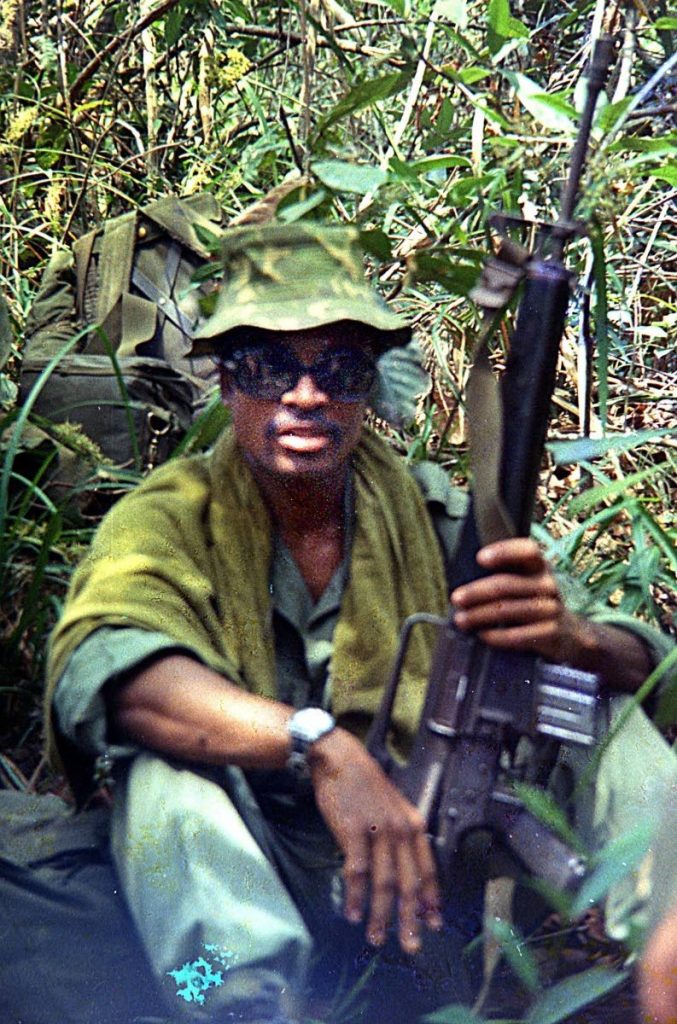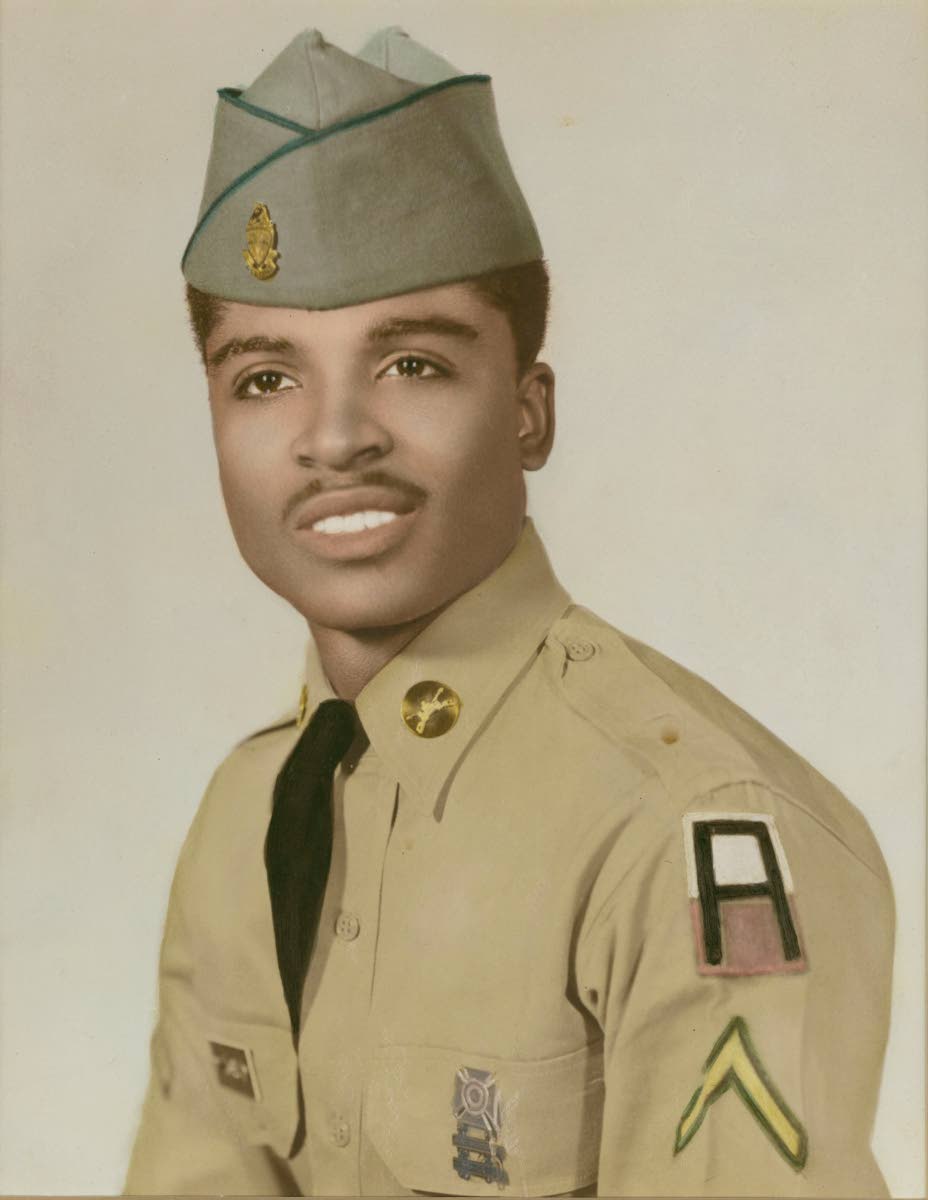Trini-born Vietnam vet to feature on PBS

Google the name Dalton Narine and you’ll see incisive pieces about newsmakers, events of global significance and the history of TT Carnival.
What you may have overlooked, though, is that this Trinidadian-born writer, columnist, cultural aficionado and archivist is also a Vietnam war veteran, who has written extensively over the years about how the experience has impacted his life.
In their latest project, The Vietnam War, celebrated documentarians Ken Burns and Lynn Novick explore the effects of the war in an unapologetically gritty ten-part series, which begins today on the US-based Public Broadcasting Station (PBS).
And, as fate would have it, Narine has been invited to contribute a piece for the film.
“I cannot wait to see it on PBS,” Narine tells Sunday Newsday from his home in Kendall, Florida.
The War occurred in Vietnam, Laos and Cambodia from November 1, 1955 to the fall of Saigon on April 30, 1975.
An internet synopsis of the film states that the war “ripped apart our (US) nation’s social and political fabric, creating divisions that exist to this day.
“For 18 hours over ten nights, they (Burns and Novick) attempt to explain the war and its effects, offering as many perspectives as possible while trying to answer a question that still haunts so many who lived through the conflict: ‘How could this have happened?’”
Although Narine has conveyed his experiences of war in various fora, including publications such as the US-based Village Voices and Miami Herald, he is especially excited about this film.
“He (Burns) is the only person who has ever tackled the Vietnam War,” Narine said.
Narine recalled that Burns also produced provocative films about the history of jazz and the controversial Central Park Five case in which a female jogger, Trisha Meili, had accused five young black men of violent assault and rape in New York City’s Central Park, in 1989.
Narine, who wrote poetically about events that occurred in service for the film, suggested he was selected because of his stories about the Vietnam War over the years.
“PBS sent some information where they were looking for Vietnam veterans to write something about their experiences, and I said this was something that was right up my alley because I have a whole lot to say. They liked what I wrote and they have agreed to publish it in the project.”
Born in Gonzales, Belmont, Narine’s early years were spent in the communities of Laventille, Barataria and Port of Spain, experiences which cultivated his love for Carnival.
Later, while studying at Howard University in the US, Narine had to enroll in the Reserve Officer Training Corps (ROTC), by law. The ROTC was a must for residents or citizens of the US.
“I left Howard two years later to attend Brooklyn College and Hunter College and, upon my return from the war, New York University,” he recalled.
“Because I quit Howard, and by extension ROTC, my military file was automatically transferred to the draft board. And that’s how I got drafted. If you’re not in school and/or ROTC, you become eligible for the draft.”
Because of Narine’s high test scores in basic training and his stint in the ROTC, the army sent him for further training as an air traffic controller at Keesler Air Force Base in Biloxi, Mississippi.
Narine recalled he was the only black soldier at Keesler.
“I graduated number one in the class and also passed the Federal Aviation Agency (FAA) exam that qualified me for a job upon my discharge at a tower or radar unit anywhere in the US.
“Later, the Army trained me as a combat controller — the finishing touch to my MOS (Military Occupation Speciality) in preparation for heliborne assault missions, a key component of America’s new-wave warfare.
“We were really at the top of our game, that is, until the North Vietnamese Army introduced booby traps.”
Narine told Sunday Newsday one of his best friends, whom he called Slick, got his face blown off by a booby trap.
“He’s always in my heart,” Narine said.
As a team member, Narine said he would often be “inserted” by helicopter into hostile areas to establish landing and pick-up zones for air assaults, long range reconnaissance patrols and medevac missions.
He also would be called upon to shuttle out the wounded during day and night operations.
“It was high profile duty and I loved it.”
Asked what was his most memorable experience in the war, Narine recalled that at one time, the fire base in the middle of the jungle was surrounded one afternoon by Viet Cong forces.
“Amid the battle, I had a beef with a grumpy Phantom jet pilot whose bombing run I’d rerouted because he was heading into an artillery salvo. Here’s how it went:
Pilot: “Brooklyn niner one, this is Paula five zero, who are you? What’s your name and unit? Over!”
Me: “Paula five zero, Brooklyn niner one, that’s classified, Sir.”
“I know it wasn’t. But I had the power. Besides, artillery rounds would have cut up his jet in ribbons and he’d be toast. He’s lucky I saved him.”
Narine said there also were some quirky moments.
“There was one time I got bitten in the jungle by about 1,000 ants after my shoulder brushed against a six-foot termite mound and there were Vietnamese Scouts who could speak a little English,” he said.
“I swear that morning the guy went left and he suddenly went right and I decided to follow him and the next thing I knew was that I went smack into the mound.
“They had to stop the operation for about 15 to 20 minutes. The guy was just beating everything off of my face, my back. But we fulfilled the mission in the end.”
In spite of his many heroic missions, Narine said he still experienced sleepless nights.
“I get terrible nightmares,” he said.
He would conjure images of the ghosts of 53 men, “half of my company,” bringing him out of a house to watch “their cruel theatre of war.”
“They’d be wrapped in gauze flecked with dried blood,” Narine said. “The ghosts would ride two flatbed trucks in a tangle of broken limbs and Picasso faces.
“Such hallucination jangles my nerves and rob me of sleep.”
Revealing he has spent ten years in group therapy, Narine said to this day, he still has sessions with a psychiatrist every six weeks “plus a whole mess of meds.”
Narine said everyday, on average, at least 22 veterans commit suicide.
“But group therapy has kept me alive. It’s why I don’t own a gun. I’d use it, for real.”
Narine advises young people against joining the army.
“They should get a degree and live a normal life,” he said.
“War movies aren’t the real deal. I lived it. I know. But, I served the country and I’m proud of that, though I had reservations doing so.”
For example, Narine recalled he once “balked at flying on a chopper with the Confederate flag painted on the aircraft’s door and nose.”
Still, he admitted it had not been easy to sever ties, particularly in the years after he left the service.
He said, “I became a true activist, and when I got back to the States I joined Vietnam Veterans Against the War (VVAW) organisation.”
Narine said, apart from being the first black individual in the group, he was one of its speakers at rallies all over New York City and other cities.
“That’s how the Village Voice found me,” He said. “I became one of its writers. It’s how I got to write a piece about racial warfare for Esquire magazine and how I was tabbed for a role in a documentary with a marine and another black Army vet.”


Comments
"Trini-born Vietnam vet to feature on PBS"